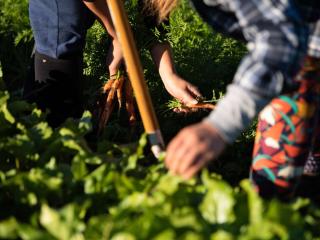

WWOOFing is a concept created in 1971 in the United Kingdom. At first, it just aimed to make exchanges easier between organic food farmers and city dwellers. Today, it’s a rapidly-growing organization that connects volunteers and welcoming host farms. But what is WWOOFing in reality?
Definition, origins, values, and network: you will discover everything in this article.
In the 1970s, Sue Coppard, a London secretary, was seeking out organic farms to spend the weekend. Sue wanted to contribute her free time and breathe a little fresh countryside air. To do this, she reached out to fifteen or so farmers. They liked the idea! The experience was so uplifting that Sue wanted to enable more city dwellers to experience rural life with committed producers. WWOOFing was born!
WWOOFing (World Wide Opportunities on Organic Farms) is an international movement that works to facilitate the sharing of skills in organic agriculture.
 The concept is simple: a WWOOFer goes to a particip ating farm and joins in on the farm work, usually around 20-25 hours a week. In exchange for this daily help, they are not only provided with accommodation and meals but also benefit from the host’s know-how. The commitments of each party are outlined in the WWOOFing charter, signed by all network members upon registration.
The concept is simple: a WWOOFer goes to a particip ating farm and joins in on the farm work, usually around 20-25 hours a week. In exchange for this daily help, they are not only provided with accommodation and meals but also benefit from the host’s know-how. The commitments of each party are outlined in the WWOOFing charter, signed by all network members upon registration.
The objectives of WWOOFing are to:
The 3 main pillars of WWOOFing are:
 Trust, tolerance, and generosity as moral values.
Trust, tolerance, and generosity as moral values.The network includes a wide variety of farms, and learning opportunities are plentiful: market gardening, fruit and nut processing, beekeeping… possibilities are endless!
The WWOOF movement is now well-developed across the planet, with over 12,000 hosts and 100,000 volunteers! One advantage is that it is supported by a formal, global network of associations that ensure proper mediation and communication:
 In around fifty countries, the network has an official local branch that is responsible for WWOOF over its assigned territory. To prevent abuse, representatives regularly visit farms. These associations also send feedback questionnaires and notify members who do not comply with the charter.
In around fifty countries, the network has an official local branch that is responsible for WWOOF over its assigned territory. To prevent abuse, representatives regularly visit farms. These associations also send feedback questionnaires and notify members who do not comply with the charter.The most active communities are Australia, France, the United States, and New Zealand.
Since 2012, all WWOOF branches came together within the FoWO global federation. Its mission is to ensure cohesion among local groups, energize the network, and protect the movement as a whole.
In recent years, the WWOOF movement experienced a strong and well-structured expansion. It is gaining lots of recognition. This model is ideal for traveling, acquiring new knowledge, and simply immersing oneself in a different environment.
To delve deeper: